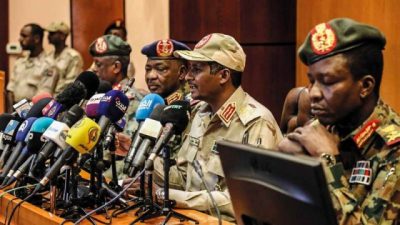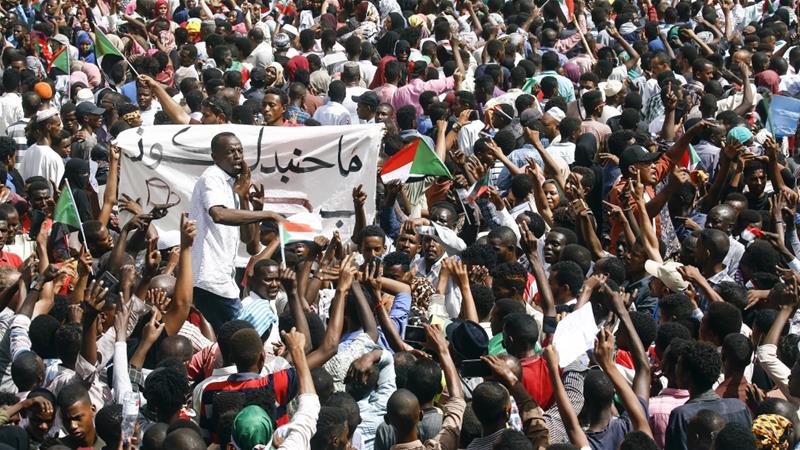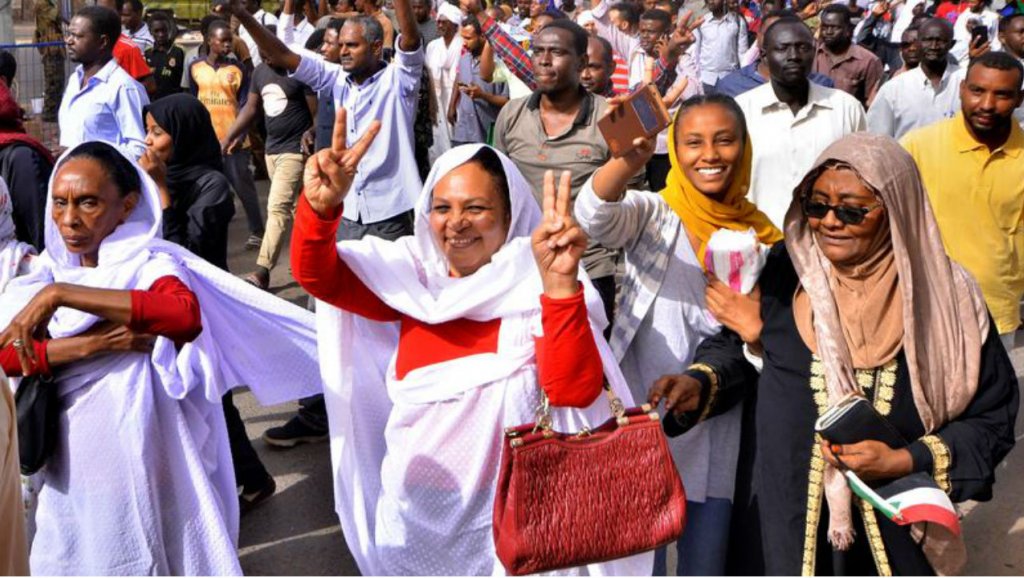Military Coup in Sudan, Overthrow of President Al-Bashir: Transitional Process Impeded by Domestic and International Factors
The breaking up of the sit-in outside military headquarters and the intervention of the African Union has not brought stability to this oil-producing state

With the suppression by the military of the popular movement for democracy in the Republic of Sudan the current situation inside the country remains indecisive.
On June 3 the Rapid Security Forces (RSF) backed by the Sudanese Armed Forces (SAF) violently disrupted an occupation being staged in Khartoum over the previous two months.
Demonstrations have taken place in this oil-rich nation since December when a sharp increase in bread and other commodities prices prompted mass protest. After commencement of the sit-in on April 6, just five days later the military leadership overthrew the government of President Omer Hassan al-Bashir who had ruled Sudan for three decades.
Sudan demonstrations led to the ouster of President al-Bashir
Negotiations between the Transitional Military Council (TMC) and the Forces for Freedom and Change (FFC), an alliance of professional groups and various opposition political organizations, have broken down. FFC leaders are refusing hold direct talks with the TMC due to the actions carried out by the army and militias which resulted in the deaths of over 100 people.
Ethiopian Prime Minister Abiy Ahmed visited Khartoum in an effort to mediate a settlement aimed moving the country towards civilian rule. Nonetheless, differing interpretations of the process for restarting talks have resulted in a social quagmire where neither the opposition groupings, which have not achieve total uniformity, along the military leadership, both appear to be unsure over which immediate directions are appropriate for the present circumstances.
Outside international interests including the United States, Saudi Arabia and the United Arab Emirates are taking measures which bolster the TMC. Through Riyadh and Abu Dhabi, the TMC is being subsidizes providing the basis for non-compliance with the demands of the FFC.
Egypt, which is the current chair of the continental African Union (AU), has supported the military in Khartoum. The approach of the AU as represented by President Abdel Fattah el-Sisi, is designed to maintain stability while at the same time follow the stated mandate of the AU of not recognizing regimes which come to power through military force.
Consequently, the Republic of Sudan has been suspended from AU membership while at the same time the TMC is hosting Ethiopian Prime Minister Abiy as well as an appointed mediator from Addis Ababa, the seat of the continental organization. Although the U.S. administration of President Donald Trump condemned the crackdown on protesters in early June, a very limited role within the diplomatic arena is evident from Washington.
The U.S. had for many years maintained a hostile stance towards Sudan. The National Congress Party (NCP) government of ousted President al-Bashir over an extended period refused to abide by the foreign policy imperatives set down by successive administrations in Washington.
Two of the primary factors in the strained relations were the role of the People’s Republic of China in the burgeoning oil industry during the 1990s and the first decade of the 21stcentury, where Beijing has been enhancing its relations with the emerging petroleum producing state. In addition, support for the Palestinians and close diplomatic relations with Iran was strongly objected to by the U.S.
However, over the last several years there has been a dramatic foreign policy shift by the NCP administration. The participation by the Sudanese military in the western-backed war against the Ansurallah in Yemen marked a departure in regard to its relations with Tehran.
Overtures to the U.S. have become more pronounced while greater dependence upon Saudi Arabia, the UAE and Cairo increased. Despite these efforts by Khartoum, Washington and Wall Street is committed to bringing about the total subservience to an imperialist agenda for Sudan.
Political Composition of the FFC and Implications for Domestic and Foreign Policy
The most prominent of the opposition groups in Sudan which had demanded the resignation of the NCP government of ousted President al-Bashir is the Forces for Freedom and Change. This alliance issued a statement on January 1, 2019 with a program calling for various reforms to be enacted immediately.
According to the Declaration for Freedom and Change Forces (FFC):
“We, the people of Sudan across cities and villages, in the north, the south, the east, and the west; join our political and social movements, trade unions and community groups in affirming through this declaration that we will continue the course of peaceful struggle until the totalitarian regime is removed and the following goals are achieved: First, the immediate and unconditional end of General Omer al-Bashir’s presidency and the conclusion of his administration. Secondly: The formation of a National Transitional Government. This transitional government will be composed of qualified people based on merits of competency and good reputation, representing various Sudanese groups and receiving the consensus of the majority. Their role is to govern for a term of four years, until a sound democratic structure is established, and elections held.” (See this)
This same document continues by demanding an end to civil wars still raging inside the Republic of Sudan; the creation of a united front made up of various political interests; that special attention should be paid to improving the economic status and social welfare of the people inside the country; an effort to what is described as the rehabilitation of the image of the Republic of Sudan; the building of relations with neighboring governments and foreign states, with specific focus upon the newly-founded Republic of South Sudan which broke away from Khartoum with the full support of the U.S., Britain and Israel during 2011; and a respect for freedom of speech and the right to gather in order to address grievances.
The Declaration was signed by 22 different organizations including the SPA, which is listed first, and other academic, youth, women’s and civil society groupings. Interestingly enough, various opposition parties which have long been at odds with the NCP were not listed as signatories to the document.
Sudan protests chants led by women opposition forces
Another political force involved in the mass efforts to overthrow the military and bring into existence civilian rule is the Sudanese Communist Party (SCP). The party has expressed its solidarity with the FFC and the SPA. Nevertheless, the SCP in its statements emphatically emphasizes the critical role of trade unions in the struggle to replace the TMC.
In a statement issued on June 17, the SCP also urges elements within the military which are disgruntled with TMC rule to join the popular movement. This line says specifically that:
“Attempts must be made to win the soldiers of the armed forces into the revolution, and there are already references to the possibility of doing so. A TV channel had a dialogue with a member of the intelligence agency who had split to join the revolution, saying that the uniformed soldiers were stripped of their weapons and moved from their positions near the picket (sit-in) before the massacre and replaced by elements of the support forces (RSF). In other words, the generals were not fully confident of the loyalty of sectors of soldiers, who might have been following orders to kill the demonstrators.” (See this)
Prospects for Change and the Role of Divergent Political Interests
Other armed groups including the Sudan People’s Liberation Movement (North) and various organizations in Darfur where a full blown conflict had taken place several years ago against the central government in Khartoum, have been engaged in the discussions centering on establishing a new dispensation. However, it appears these efforts have not been successful in destabilizing the TMC during the period since the crushing of the mass demonstrations in early June.
The question becomes how long can the TMC hold out for its ultimate aim which is the acceptance of its “legitimate” role in the post-Bashir era? TMC spokespersons continue to articulate their willingness for the transition to a civilian government despite the repressive measures utilized against protesters.
At the same time the FFC and its allies must reset the character of popular resistance while maintaining a semblance of unity. Further repression against the FFC can only be transcended by the utilization of tactics which subvert the capacity of the TMC to maintain state power.
Washington is covertly attempting to influence the developments in Sudan since its objective is to ensure the maintenance of the state within imperialist sphere of influence. Only the sustainable resistance and revolutionary fervor of the people organized can supersede the forces of reaction leading to a people’s government and revolutionary transformation process.
*
Note to readers: please click the share buttons below. Forward this article to your email lists. Crosspost on your blog site, internet forums. etc.
Abayomi Azikiwe is the editor of Pan-African News Wire. He is a frequent contributor to Global Research.
All images in this article are from the author



